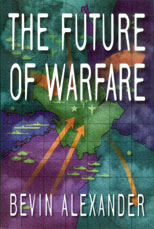 Click here to purchase from Barnes & Noble.
Click here to purchase from Amazon.com.
Click here to purchase from Barnes & Noble.
Click here to purchase from Amazon.com.
Lawrence of Arabia’s Strategy
Excerpt from The Future of Warfare, by Bevin Alexander, pages 119-21
Lawrence applied his mind to the essential strategic problem the Turks faced in Arabia [in World War I] and how the disparate, competitive tribes best could exploit this problem. He saw what the British military leadership in Cairo did not see: that the Hejaz Railway [from Damascus to Medina, Arabia] was the Achilles' Heel of the Turks and could be used against them.
The British leaders saw merely that the railroad was the only means of supply for the Medina garrison. Therefore, they reasoned, the Bedouins should come out of their natural environment, the Arabian Desert---through which much of the railway ran---and cut the line. To keep the line cut the Arabs would have to fight a stand-up battle against heavy Turkish arms. If the Arabs won, the Turks would be forced to abandon Medina and the Hejaz. Thus the British wanted the Arabs to employ the conventional way of making military decisions.
Lawrence recognized three fallacies in the argument: 1) the Arabs must acquire large numbers of heavy weapons that could meet Turkish arms on an equal basis, and would have to be trained in their use, neither of which the British were likely to provide; 2) the Arabs had no generals skilled in conventional war and their tribal structure rendered them incapable of the military discipline and organization necessary to confront the Turks in open battle, and 3) if the 25,000 Turks in the Medina garrison moved north, they could reinforce the Turkish-German army in the Sinai, mount a greater threat to the Suez Canal, and make it even more difficult for the British.
Lawrence came up with a far more subtle and suitable plan to stymie the Turks in Arabia and assist the British army in driving into Palestine and forcing the Turkish empire to quit the war. He proposed that the railway be sabotaged regularly but that it be kept barely open, just capable of feeding the Turks at Medina. This would force the Turks to devote most of their strength to defending the line, leaving little energy for other actions. He was confident the Turks would remain in Medina as long as possible. As Moslems, their possession of the holy city confirmed their legitimacy as the sovereign power. Thus, the Turks holding Medina would become as ineffective in fighting the British as if they were lodged in a prisoner-of-war camp.
Lawrence also saw that the Arabs, with light arms and few more skills than they already possessed as desert mounted men, could break the railway, disappear rapidly into the desert, and reappear at some other place, repeatedly. As had happened in South Africa, this would create a military stalemate that the occupying power over time could not endure. Lawrence's was a classic recipe for guerrilla warfare, adapted to the peculiar circumstances of the Turkish occupation and the Arabian Desert.
If the Arabs had come "like an army with banners," the Turks would have defended Arabia by a trench line, Lawrence wrote. "But suppose," he went on, "we were an influence, an idea, a thing intangible, invulnerable, without front or back, drifting about like a gas?"
In comparison with the Bedouin who "might be a vapor, blowing where he listed," conventional armies, Lawrence wrote, are "like plants, immobile, firm-rooted, nourished through long stems to the head." That is, an invading or occupying army can only survive if it is constantly replenished with food, ammunition and other supplies delivered from a distant source, usually the army's homeland. This supply line is the army's umbilical cord. If it is cut, the army withers away. On the other hand a guerrilla army can move at will in any direction, for long periods, more or less independently of its supplies, since it carries the small amounts of ammunition it needs and usually takes along its food as well, or can get more from friendly natives.
Lawrence thus outlined a condition that has bedeviled all conventional armies at all times when they are confronted with an enemy who refuses to encounter them directly "like an army with banners." When an enemy moves away from an army's power, toward its weakness, he has the capability of deadlocking the ordinary army, denying it victory, even if he can't destroy it.
<< More 'World War I' Excerpts << Back to top